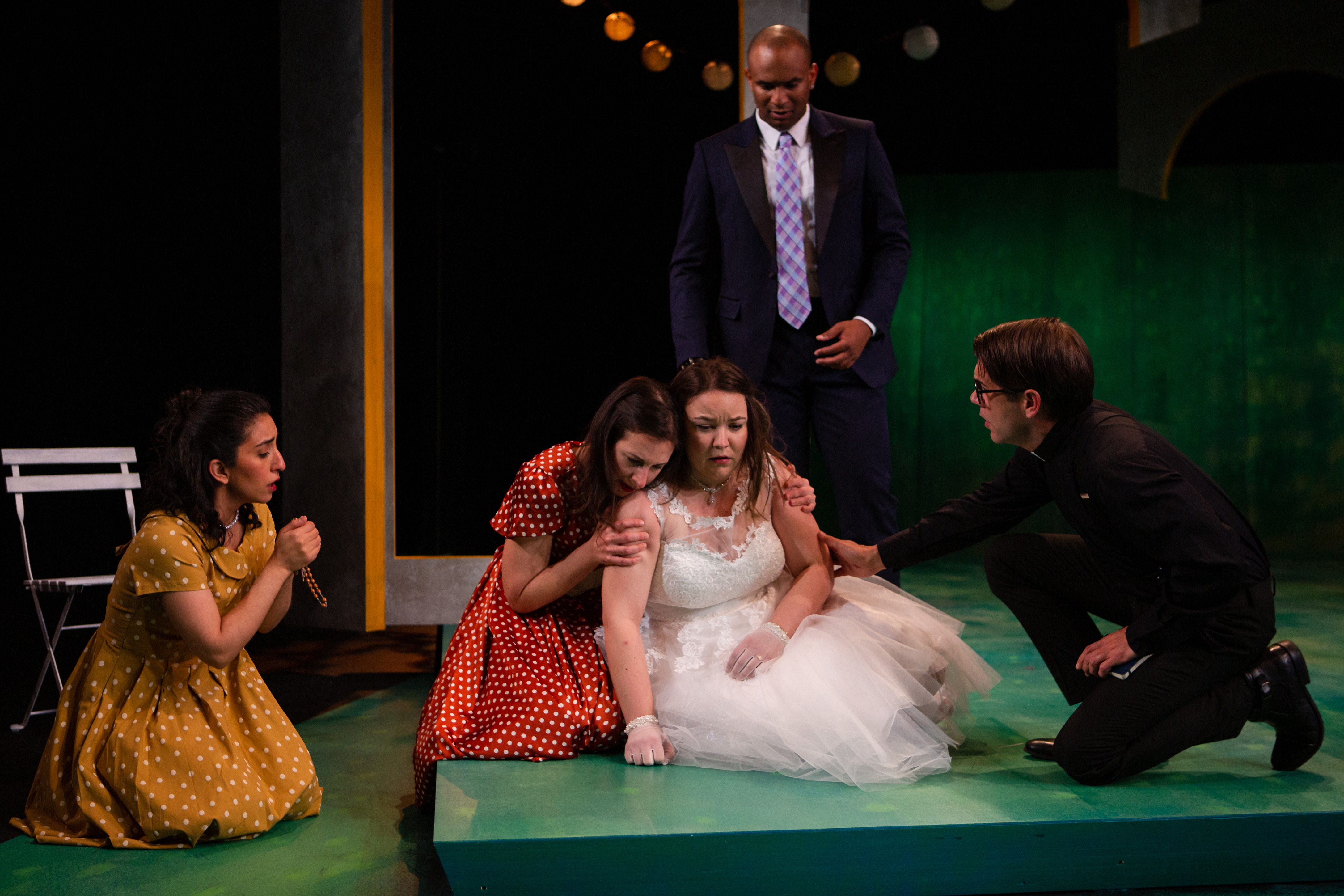Seattle Shakespeare Has Little to Say About Much Ado
Review of Much Ado About Nothing presented by Seattle Shakespeare Company
Written by Teen Writer Adrian Martin and edited by Teen Editor Disha Cattamanchi

The Seattle Shakespeare Company took the title of Much Ado About Nothing very literally in a half-hearted, Bachelor-esque adaptation with very little to say. Arriving home from a vague war to a country club romance, Benedict and Claudio are looking for love. Beatrice is trying to get back at Benedict for breaking her heart, and Hero is looking for a husband. A reality TV-esque web of lies and rumors twist through this island summer setting.
The one thing that makes this adaptation worth watching is the acting. Unconventional casting asserted the dignity of the female characters with entirely non-male love interests. The adaptation had a new and holistic take on the sweet, sought after Hero (Joellen Sweeney), who is usually a helpless damsel type in the original source material. Her anti-heroic love interest, Claudio (Meme García), proves that regardless of gender, leaving someone at the altar is always a dick move. Sweeney preserves the grace and kindness of Hero throughout the second act without taking away her agency, which proves to be an impressive balancing act. Sweeney’s Hero did not shrink when upstaged by her more grandiose family. When her reputation is on the line in Act Two, you can feel the rage radiating off of Hero, who is so typically played as a submissive damsel-in-distress. She does not take Claudio back because she thinks she deserves his treatment; rather, she does so out of the kindness of her heart and her belief in redemption. Sweeney is a powerful force on stage, bringing a new life to this previously bland, shrinking violet.
Benedict (M.L. Roberts) and Beatrice (Jonelle Jordan) had a reluctantly charming chemistry, unfortunately overshadowed by director Allison Narver’s careless construction of the romance. As the classic enemies-to-lovers plot hazardously unfurled, Narver seemed to inject little intention into this adaptation. It was clear she didn’t have anything new to say about this couple, reducing them to a dorky, pining mess. It seemed as though, not knowing what to do with the romance, Narver turned the characters into tropes of “Bland forgettable soldier type” and “Spunky BuzzFeed feminist.” The scenes where Benedict and Beatrice respectively eavesdrop on their friends, loudly proclaiming that each has an unrequited love for the other, were monotonous. In almost identical blocking, Beatrice and Benedict made exaggerated faces of shock as they comedically stumbled around the stage. It added little to their character arc or relationship, and the 20 repetitive minutes of identical slapstick got old quickly. Jordan seemed more committed to the comedy than the romance, in her exaggerated expressions and awkward persona, grimacing and shuffling around her supposed love interest. All this said, there were still cheers in the audience as the couple eventually confessed their feelings.

Regardless of my qualms, the casting and the directing shone in the second act. After Hero has been left at the altar and slut shamed, she fakes her own death to free herself from the rumors. Highlighting her heartbreak and the cruelty of the situation, she sobs in her wedding dress with friends surrounding her. Hero’s arc is concluded when Claudio unknowingly proposes to her in an effort to make things right with her family. When she reveals herself, Claudio falls flat on his stomach, silently begging for her forgiveness. This was the moment where the previous lack of objective revealed a poignant climax, as every character on stage waited for Hero to make her choice. The silence on-stage reveled for an agonizing moment. Only at her nod did the scene continue. It was these little character choices that asserted Hero’s agency throughout the show.
These brief moments of intention highlighted what the show could have been if it had stayed consistent in its thoughtful directing. But alas, any motive behind the casting was muddled by the visual design of the show. The set was reminiscent of a reality TV set, though not committed enough to any particular aesthetic to be interesting. The costumes were confused on what era they appeared from, a noncommittal blend of 50s, 2010s, and modern aesthetics. Altogether, the costuming distracted from the otherwise stellar performances. By setting this show among the air headed elite, it lowered the stakes, softening powerful moments. It had all the dated elements of a modern piece without any of the relevance, making the characters seem more like drunk rich idiots than people with stories to tell.
A country club romance with a confused setting, this adaptation was saved from the astounding boredom by an impeccable cast. Though some of the bits were repetitive and stale, it is clear that the actors understand Shakespeare. It’s not easy to make a comedy written in 1612 funny and relevant today, but this adaptation succeeded in preserving both the comedy and the indignant circumstances of Much Ado About Nothing, making it a great production for anyone new to the Bard. Narver’s adaptation was solidly charming, entertaining, and comprehensive Shakespeare.
Lead Photo: M.L. Roberts and Jonelle Jordan in Much Ado About Nothing. Photo by John Ulman.
The TeenTix Newsroom is a group of teen writers led by the Teen Editorial Staff. For each review, Newsroom writers work individually with a teen editor to polish their writing for publication. The Teen Editorial Staff is made up of 6 teens who curate the review portion of the TeenTix blog. More information about the Teen Editorial Staff can be found HERE.
The TeenTix Press Corps promotes critical thinking, communication, and information literacy through criticism and journalism practice for teens. For more information about the Press Corps program see HERE.

